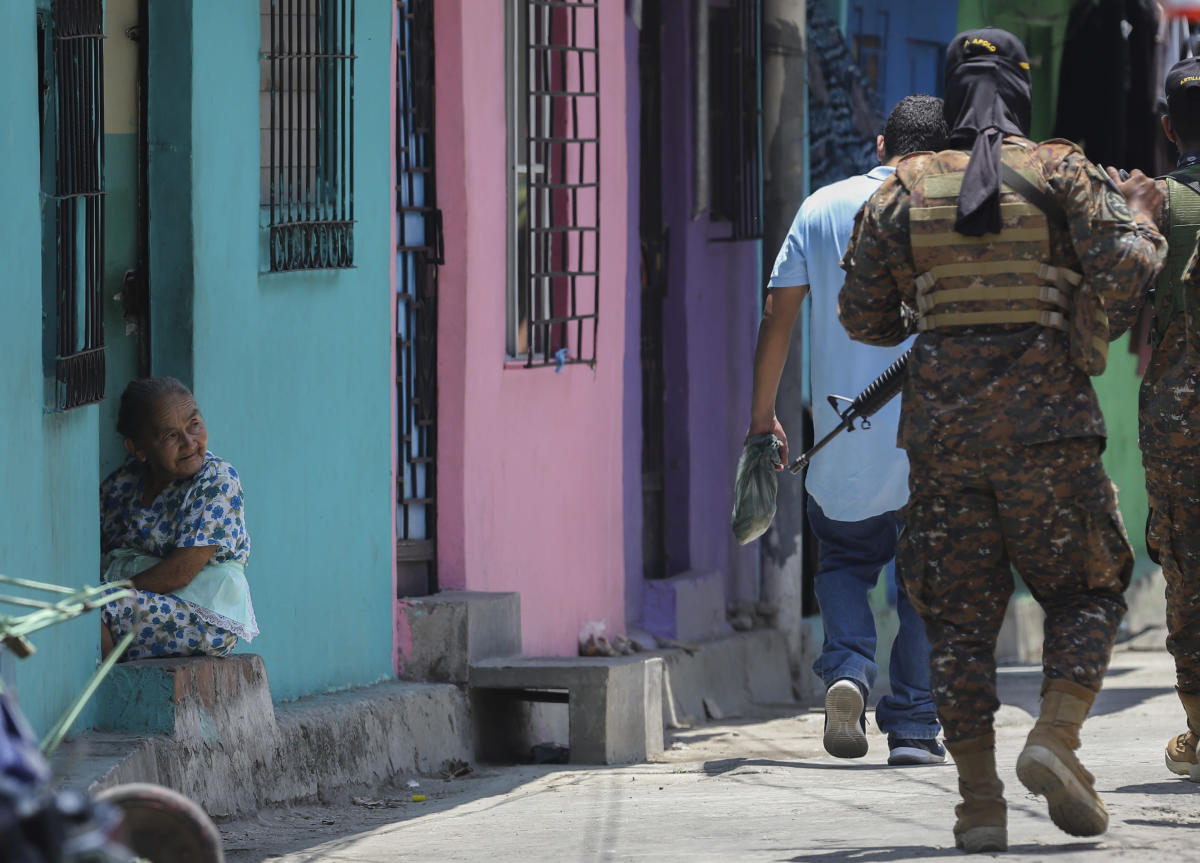
SANTA TECLA, El Salvador (AP) — A day after the bloodletting — 62 gang killings that convulsed El Salvador — the crackdown began.
Before dawn on Sunday, March 27, just hours after congress approved a state of emergency, heavily armed police and soldiers entered the packed, gang-controlled neighborhood of San Jose El Pino.
Freed from having to explain an arrest or grant access to a lawyer, they went door to door, dragging out young men. They established a perimeter with barbed wire barricades where they controlled who entered and who left, demanding identification and searching everyone.
President Nayib Bukele has responded to the surge in gang killings with mass arrests in poor neighborhoods like San Jose El Pino, each day posting the growing arrest total and photos of tattooed men. The highly publicized roundups are not the result of police investigations into the murders in late March, but propel a tough-on-crime narrative that critics are calling “punitive populism.”
In just over two weeks, more than 10,000 alleged gang members have been arrested — a huge number for a small country of 6.5 million people. They can be held for 15 days without charges, one of the measures decried by international human rights groups and the U.S. government.
“They came in with everything,” said 36-year-old Héctor Fernandez on his way to his factory job on a recent morning. “Whoever didn’t open the door, they knocked it down. They were looking for the guys. I think they took almost all of them, but others managed to get out.”
Critics say the mass arrests are more show than substance. They note that amid all of the chest-thumping rhetoric and slickly produced videos of roughly handled prisoners, authorities are not talking about the investigations or arrests of those suspected of actual involvement in the March 26 killings. But many Salvadorans are pleased to see action against gangs that have long-terrorized their communities.
“It’s for everyone’s safety,” Fernandez said, nervously looking around to see if anyone was watching. He said he minds his own business and hasn’t had trouble with the Mara Salvatrucha, the gang that controls his neighborhood. “I leave, (police and soldiers) search me. I go to work, come back in the evening, they search me. I pass and go home.”
Bukele, a highly popular master of social media, has filled his platforms with photos of handcuffed and bloodied gang members, orders to his security cabinet and attaboys from his supporters. At the same time, he has lashed out at human rights organizations and international agencies critical of some measures.
“If we don’t rid our country of this cancer now, then when will we ever do it?” Bukele said to a parade ground of soldiers — and the world — in a video he released last week. “We will go and find them wherever they are. Regardless of who protests. Regardless of how angry the international community gets.”
Gangs control swaths of territory through brutality and fear. They’ve driven thousands to emigrate to save their own lives or the lives of their children who are forcibly recruited. Their power is strongest in El Salvador’s poorest neighborhoods where the state has long been absent. They are a drain on the economy, extorting money from even the lowest earners and forcing businesses that can’t or won’t pay to close.
The wave of violence at the end of March — it stretched across the country and its victims included a municipal maintenance worker, a taxi driver, a farmer– demanded a government response. Bukele chose a state of emergency provided for in the constitution.
But El Salvador’s security forces and justice system had the legal tools to investigate and prosecute those involved in the killings without the suspension of fundamental rights, critics say. What they did not have was the carte blanche that has yielded the media spectacle of the past two weeks, starring Bukele as savior-in-chief.
“There are a lot of doubts about whether the measures that Bukele’s government has taken to confront the wave of murders are really aimed at investigating the crimes and responding to the victims,” said Leonor Arteaga, a Salvadoran who is program director at the Due Process of Law Foundation in Washington.
Instead, she said, it seems Bukele is using the situation “to advance his authoritarian plans and in his intention to control all critical voices and squash any dissident.”
Bukele’s office did not respond to a request for comment.
Abraham Ábrego, director of the strategic litigation program at Cristosal, a non-governmental organization in El Salvador, said his group was working to document arbitrary arrests and other abuses.
Bukele has shown himself to be masterful at building and controlling narratives, he said. “There is a term that we use called ‘punitive populism,’ which is using the state’s powers of criminal persecution to show strength, to show toughness,” Ábrego said.
On Tuesday, the head of a national police union said some high-ranking police officials had pressured officers to make false statements justifying some arrests to meet arrest quotas, including in a small remote town with no gang presence.
Omar Serrano, vice rector at Central American University José Simeón Cañas, said that like previous administrations, the president has opted for a more militarized approach to dealing with the gangs.
“This is not going to solve the country’s serious problems,” Serrano said. The government line is that the problem of the gangs is one of national security, “when deep down it is a social problem.”
After the congress approved the state of emergency, Bukele returned to lawmakers multiple times for changes to the country’s criminal code. Among other things, they lengthened sentences, reduced the age of criminal responsibility to 12 and established prison sentences of 10 to 15 years for journalists who disseminate gang messages that could cause anxiety or panic among the people.
He had already ordered his head of prisons to keep all gang members confined to their cells 24 hours a day and to reduce their meals to twice daily. “Message for the gangs: because of your actions, now your ‘homeboys’ will not be able to see a ray of sunlight,” Bukele wrote on Twitter.
Human Rights Watch, the international advocacy organization that Bukele has taken to mocking as “Homeboys Rights Watch,” said the government had overreached.
“The Salvadoran government should adopt rights-respecting measures to protect people from heinous gang violence, dismantle these groups, and bring those responsible for crimes to justice,” said Juan Pappier, senior Americas researcher at Human Rights Watch. “Instead, Bukele’s government has enacted overbroad, harshly punitive laws that undermine the fundamental rights of all Salvadorans.”
But Salvadorans seem to be ambivalent about the crackdown. In a leafy park in front of Santa Tecla’s municipal market and short distance from San Jose El Pino, Adela Maravilla Ceballos walked with her groceries on a recent morning.
“It’s good what they’re doing, they took long enough,” the 52-year-old homemaker said. “These guys don’t understand anything else. Who is going to be against security? Only the criminals.”
Still, some of the images had bothered her. Her two sons went to the United States years ago looking for better opportunities.
“I am a mother and sometimes it hurts me when they grab them and hit them and I see how they cry,” she said.
___
Sherman reported from Mexico City. AP writer E. Eduardo Castillo in Mexico City contributed to this report.




